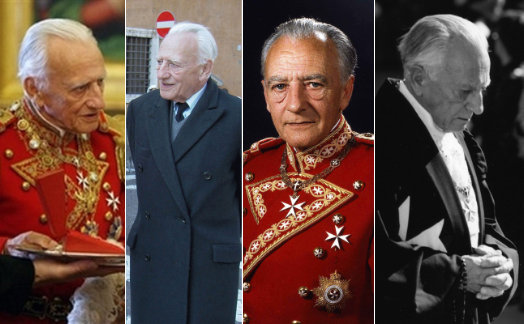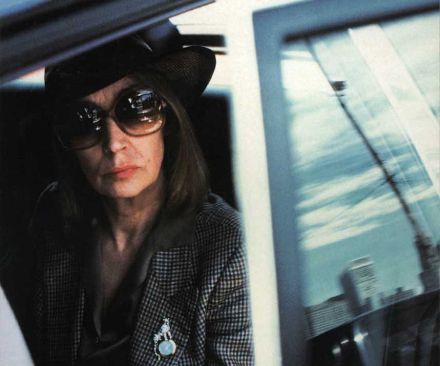Obituary
About Andrew Cusack
 Writer, web designer, etc.; born in New York; educated in Argentina, Scotland, and South Africa; now based in London.
Writer, web designer, etc.; born in New York; educated in Argentina, Scotland, and South Africa; now based in London. read more
News
Blogs
Reviews & Periodicals
Arts & Design
World
France
Mitteleuropa
Knickerbockers
Argentina
The Levant
Africa
Cape of Good Hope
Netherlands
Scandinavia
Québec
India
Muscovy
Germany
Academica
Fra’ Andrew Willoughby Ninian Bertie
Prince and Grand Master of the Sovereign Military Order of Malta, Guardian of the Poor of Jesus Christ, Veteran of the Scots Guards, Humanitarian, Teacher for 23 Years, Cultivator of Oranges

THE DEATH OF Fra’ Andrew Bertie brings to a close one of the most successful reigns of any Grand Master of the Order of Malta. Fra’ Andrew was admitted to the Order in 1956, took solemn religious vows in 1981, and was elected head of the Order in 1988. His reign as Prince and Grand Master witnessed continued modernization, as the oldest chivalric order in the world adapted to contemporary needs of humanitarian aid and the relief of suffering around the globe. Despite the continual adaptation and modernization, the Order refused to unnecessarily disregard tradition, and has continued to recall the primacy of the spiritual over the temporal. Fra’ Andrew was the first Grand Master of the Order called forth from the English-speaking world since Hugh Revel in 1258, and he oversaw the commemoration of the 900th anniversary of the Order in 1999. (more…)
Our Walter, Rest in Peace
I was very saddened to hear this morning of the sudden death of our good and loyal friend, Walter Phelan of Brooklyn. Walter was a good man, with a heart of gold, and a brilliant mind. He taught himself the law, and passed the New York bar exams in the years before at least a year in law school was required (a development which Walter would’ve been the first to tell you was an outright racket). I have no doubt that Walter will be remembered for his numerous small kindnesses. Proud of his favorite Italian bakery, he would hand out loaves of bread from there every Sunday on the sidewalk outside St. Agnes after the 11:00 Tridentine mass. Having a gift for languages, he would often exchange a few kind words with the Polish waitress in her native tongue whenever we had lunch at Bloom’s on Lexington, and he made sure to tutor his young nephew in Latin when he discovered it wasn’t offered at school.
One of the things I liked most about Walter is that he was never afraid to have a good argument. More often than not, he and I found ourselves in agreement, but it was sometimes otherwise, such as with his firm contention that Shakespeare’s plays were actually written by the Earl of Oxford. Nonetheless, he was polite and gracious in dispute, even if outspoken. Still, he was a private man, and as a friend said of him tonight, it would probably take five of his friends who’d never known eachother to piece together the story of his life. Walter heard mass three times a day, and could often be found attending masses at St. Agnes on 43rd Street, at St. Vincent de Paul’s on 24th, and at St. George’s Ukrainian Catholic Church down on 7th Street. Earnest in his desire for the salvation of souls and their eternal repose, he never missed the monthly mass of the New York Purgatorial Society. His friends will miss him very much.
Requiem æternam dona eis, Domine, et lux perpetua luceat eis.
Requiescat in pace. Amen.
La Fallaci is Dead
Leftist Italian Writer, Atheist, Defender of the West, Sometime New Yorker, Once Made the Ayatollah Laugh

Oriana Fallaci, that indomitable and cantankerous Italian, has finally succumbed to cancer in her native land. When she first learnt of her cancer years ago, she kept smoking and refused to treat it because she had “too much writing to do”. Later, when it became difficult to eat solid foods, she drank champagne instead. Her 1972 interview with Henry Kissinger was described by him as “the single most disastrous conversation I have ever had with any member of the press”.
While an ardent leftist, she was an unrepentant foe of what she saw as the Islamic colonization of Europe. Her diatribes against the Muslim immigrants who habitually pissed on the walls of Florence cathedral earned her the ire of many, and legal proceedings were initiated against her in France. The liberal commentator Christopher Hitchens described her work as “an example of how not to write about Islam”. She began writing her infamous The Rage and the Pride, a book teeming with passion and righteous indignation, on September 11, 2001 at her home in New York.
Fallaci said she felt encouraged when Cardinal Ratzinger, another thinker who warned against Western self-loathing, was elected pope. “I feel less alone when I read the books of Ratzinger,” she wrote. The Telegraph reports that the Holy Father granted her a private audience a number of months ago, on the condition that never disclose its contents.
Oriana Fallaci will be buried tommorrow in the family tomb in the Protestant Cemetery in Florence. There will be no funeral; I hope a priest will say a mass for the repose of her soul.
Daily Telegraph obituary
Times of London obituary
‘La journaliste Oriana Fallaci est morte’, Le Figaro
Major General Lord Monckton of Brenchley, 1915-2006
Knight Grand Cross of Obedience of the Order of Malta
Maj-Gen the 2nd Viscount Monckton of Brenchley, who has died aged 90, was awarded an MC in 1940 and later became director of Army public relations at a time when the Armed Forces’ public profile was growing in importance.
At 50 he retired early to run his 350-acre farm in Kent and to join the boards of a series of firms to help pay for the education of his five children. In the House of Lords he became a persistent critic of the neglect of rural and military interests, and took a lifelong interest in archaeology and water divining.
The sole Roman Catholic trustee of a £3 million appeal for Canterbury Cathedral in 1974, Monckton was president of the British Association of the Sovereign Order of Malta, and helped to ease strained relations with its Anglican counterpart, the Venerable Order of St John of Jerusalem, by taking part in ecumenical services.
He also played a key role in forming the Order of Malta Volunteers, who aid the sick at the shrine of Lourdes, and in setting up trust care homes with the Venerable Order.
Search
Instagram: @andcusack
Click here for my Instagram photos.Most Recent Posts
- Sag Harbor Cinema March 26, 2025
- Teutonic Takeover March 10, 2025
- Katalin Bánffy-Jelen, R.I.P. March 3, 2025
- Substack Cusackiensis March 3, 2025
- In the Courts of the Lord February 13, 2025
Most Recent Comments
Book Wishlist
Monthly Archives
Categories


